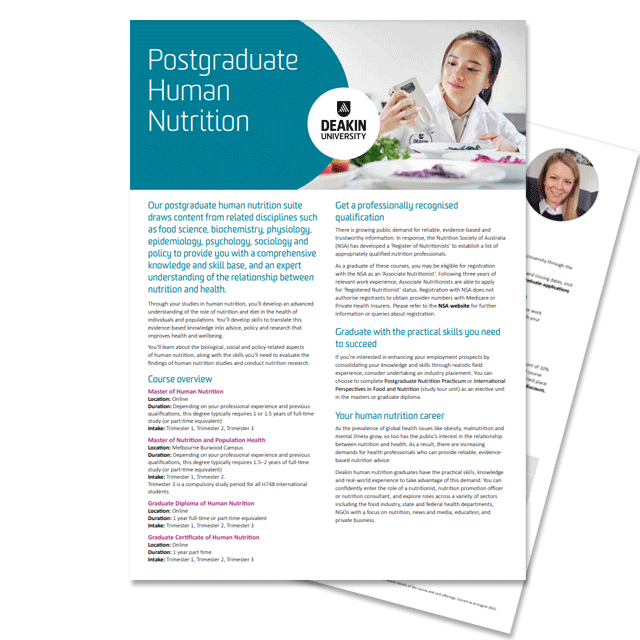Key facts
Duration
1 year, please refer to course structure below
Locations
Key dates
Direct applications to Deakin for Trimester 2 2024 close 23 June 2024
Direct applications to Deakin for Trimester 3 2024 close 27 October 2024
Current Deakin Students
To access your official course details for the year you started your degree, please visit the handbook
Course overview
Learn about nutrition across many interesting contexts from metabolic studies and food science to social and behavioural nutrition.
This course allows you to explore areas such as nutritional physiology and biochemistry, nutritional requirements, food composition, and the social, cultural and economic aspects of nutrition.
Designed as a postgraduate introduction to nutrition, this course draws from related disciplines such as food science, biochemistry, physiology, epidemiology, psychology and sociology.
Read MoreCourse information
- Award granted
- Graduate Certificate of Human Nutrition
- Year
- 2018 course information
- Deakin code
- H511
- Level
- Postgraduate (Graduate Certificate and Graduate Diploma)
- Approval status
- This course is approved by the University under the Higher Education Standards Framework.
- Australian Qualifications Framework (AQF) recognition
The award conferred upon completion is recognised in the Australian Qualifications Framework at Level 8.
Course structure
To complete the Graduate Certificate of Human Nutrition students must attain 4 credit points. All four 1 credit point units are core units (these are compulsory).
Students are required to meet the University's academic progress and conduct requirements. Click here for more information.Core units
Course structure applies for students who commenced in 2016 onwards. Students who commenced prior to 2016 should refer to previous online Handbooks or consult your course enrolment officer.
Students must enrol in the Cloud offerings of all units
Trimester 1
Trimester 2
Intakes by location
The availability of a course varies across locations and intakes. This means that a course offered in Trimester 1 may not be offered in the same location for Trimester 2 or 3. Check each intake for up-to-date information on when and where you can commence your studies.
Trimester 1 - March
- Start date: March
- Available at:
- Cloud Campus
Trimester 2 - July
- Start date: July
- Available at:
- Cloud Campus
Trimester 3 - November
- Start date: November
- Available at:
- Cloud Campus
Additional course information
Course duration - additional information
Course duration may be affected by delays in completing course requirements, such as accessing or completing work placements.
Mandatory student checks
Workload
As a student in a Cloud (online) course in the Faculty of Health you will be expected to spend 11-13 hours every week studying, interacting via CloudDeakin and completing assessment tasks for each unit in your course.
Work experience

Take the next step to a brighter future
Kickstart your career growth. We'll prepare you for the career you've always wanted.
Download course guideEntry requirements
Recognition of prior learning
The University aims to provide students with as much credit as possible for approved prior study or informal learning which exceeds the normal entrance requirements for the course and is within the constraints of the course regulations. Students are required to complete a minimum of one-third of the course at Deakin University, or four credit points, whichever is the greater. In the case of certificates, including graduate certificates, a minimum of two credit points within the course must be completed at Deakin.
You can also refer to the Credit for Prior Learning System which outlines the credit that may be granted towards a Deakin University degree and how to apply for credit.
Fees and scholarships
Fee information
Learn more about fees and your options for paying.
The available fee places for this course are detailed above.
Tuition fees are determined by your enrolment:
- If you are offered a full fee paying place, your tuition fees are calculated based on your course.
- If you are offered a Commonwealth supported place, your tuition fees are calculated depending on the units you choose. Not all courses at Deakin have Commonwealth supported places available.
The 'Estimated tuition fee' is provided as a guide only based on a typical enrolment of students completing the first year of this course. The cost will vary depending on the units you choose, your study load, the length of your course and any approved Credit for Prior Learning.
* One year full-time study load is typically represented by four credit points of study. Each unit you enrol in has a credit point value. The 'Estimated tuition fee' is calculated by adding together 4 credit points of a typical combination of units for your course.
You can find the credit point value of each unit under the Unit Description by searching for the unit in the Handbook.
Learn more about fees and available payment options.
FEE-HELP
You may be eligible for the Government's FEE-HELP scheme. This scheme covers your tuition fees and can help make studying significantly more affordable.
It's similar to HECS-HELP, but designed for full-fee place courses. It doesn't matter how much you earn, you may still be eligible for FEE-HELP.
FEE-HELP calculator
What is FEE-HELP?
FEE-HELP loans cover up to 100% of tuition fees for eligible students. By taking out a FEE-HELP loan, the government pays your tuition fees directly to Deakin, and the balance is repaid from your employment income - but only once you're earning over $51,550.
Please note: fees shown by the calculator are indicative only and based on 2024 rates. Actual fees may vary. We advise confirming fees with Prospective Student Enquiries prior to enrolment.
Estimate your FEE-HELP
FEE-HELP payments
per pay cycle
Take-home pay
after FEE-HELP and tax
per pay cycle
Your estimated FEE-HELP repayments
- $* is the estimated full cost for a Graduate Certificate of Human Nutrition (4 credit points), based on the 2024 fees.
- is the annual FEE-HELP payment, based on your current salary
- of your current salary be spent on FEE-HELP
*Disclaimer
Deakin University (Deakin):
- gives no warranty and accepts no responsibility for the currency, accuracy or the completeness of the information provided;
- advises users that no reliance should be placed upon on the information provided, and;
- instructs users that they should confirm the actual course fee with Prospective Student Enquiries prior to enrolment.
This tool provides indicative information about the fees that will be payable in respect of courses and subjects offered to prospective students domiciled in Australia during the periods indicated.
Please note that the fees shown by the calculator are indicative only and actual fees may vary. Users are advised to confirm the actual course fee with Prospective Student Enquiries prior to enrolment.
The estimated course fee is based on the tuition fee costs applicable to a domestic full time student commencing the course in Trimester 1 and studying full time for the duration of the course but:
- does not include non-tuition costs that may apply, such as Student Services and Amenities Fees (SSAF);
- does not take into account any scholarships or bursaries awarded to the student (including the 10% Deakin alumni discount);
- assumes the maximum number of units that need to be successfully completed actual number completed may be reduced if recognition of prior learning is granted;
- assumes that no exceptional, or non-typical, circumstances apply to the proposed course of study;
- assumes that the options that the user selects are appropriate for the course of study that they intend to undertake;
- where fees are estimated for future years those fee will be subject to annual increases in accordance with increases in the cost of course delivery.
Scholarship options
A Deakin scholarship might change your life. If you've got something special to offer Deakin – or you just need the financial help to get you here – we may have a scholarship opportunity for you.
Postgraduate bursary
If you’re a Deakin alumnus commencing a postgraduate award course, you may be eligible to receive a 10% reduction per unit on your enrolment fees.
Apply now
Some of our courses have limited places available - for the latest on courses still open for application, visit Courses by trimester.
Create an account in the Deakin Application Portal, start your application, enter personal details, education experience, upload supporting documents and submit. Need help? Play this video, or contact one of our friendly future student advisers on 1800 693 888 or submit an online enquiry.
For more information on the application process and closing dates, see the How to apply webpage. If you're still having problems, please contact us for assistance.
Entry pathways
This course can be a pathway to:
Contact information
Health - Student and Academic Services
Tel 03 9251 7777
health-enquire@deakin.edu.au
Careers
Career outcomes
Graduates will be equipped to find careers as a nutritionist, but many roles may require an undergraduate science/health degree or some further postgraduate studies to ensure a broader knowledge and skill base.
Graduates can expect to gain employment in a wide range of organisations such as community organisations dealing with food and nutrition issues, food industry, media and communications.Professional recognition
Growing public interest in the relationship between diet and health is evident and, as a result, there are increasing demands from the public for reliable and trustworthy information. In response, the Nutrition Society of Australia (NSA) has developed a ‘Register of Nutritionists’ to establish a list of appropriately qualified nutrition professionals.
As a graduate of this course, you may be eligible for registration as an ‘Associate Nutritionist’. Following three years of relevant work experience, Associate Nutritionists are able to apply for ‘Registered Nutritionist’ status. Registration with NSA does not authorise registrants to obtain provider numbers with Medicare or Private Health Insurers. Please refer to the Nutrition Society of Australia website for further information or queries about registration.
You can find additional careers information about this course here
Course learning outcomes
Deakin's graduate learning outcomes describe the knowledge and capabilities graduates can demonstrate at the completion of their course. These outcomes mean that regardless of the Deakin course you undertake, you can rest assured your degree will teach you the skills and professional attributes that employers value. They'll set you up to learn and work effectively in the future.
| Graduate Learning Outcomes | Course Learning Outcomes |
| Discipline Specific knowledge and capabilities | Apply key principles, concepts and evidence-based knowledge of nutrition and health to nutrition related health problems. |
| Communication | Select and use appropriate modes of communication to obtain and share evidence based nutrition knowledge. |
| Digital Literacy | Select and use appropriate technologies to analyse and interpret nutrition information, and to share knowledge, skills and ideas. |
| Critical thinking | Analyse and synthesise information and problems in nutrition, to inform high level independent judgements. |
| Problem Solving | Apply best practice and evidence to identify problems and generate practical solutions to a range of nutrition issues. |
| Self-management | Employ personal accountability and demonstrate effective work practices, responsible judgement, adaptability to new situations and responsibility as a nutritionist. |
| Teamwork | Establish, contribute and maintain a key role in relationships with a range of stakeholders to achieve successful outcomes to advance nutrition sciences. |
| Global Citizenship | Engage in professional and ethical practice that demonstrates a high level of personal autonomy, within diverse contexts in nutrition sciences. |




